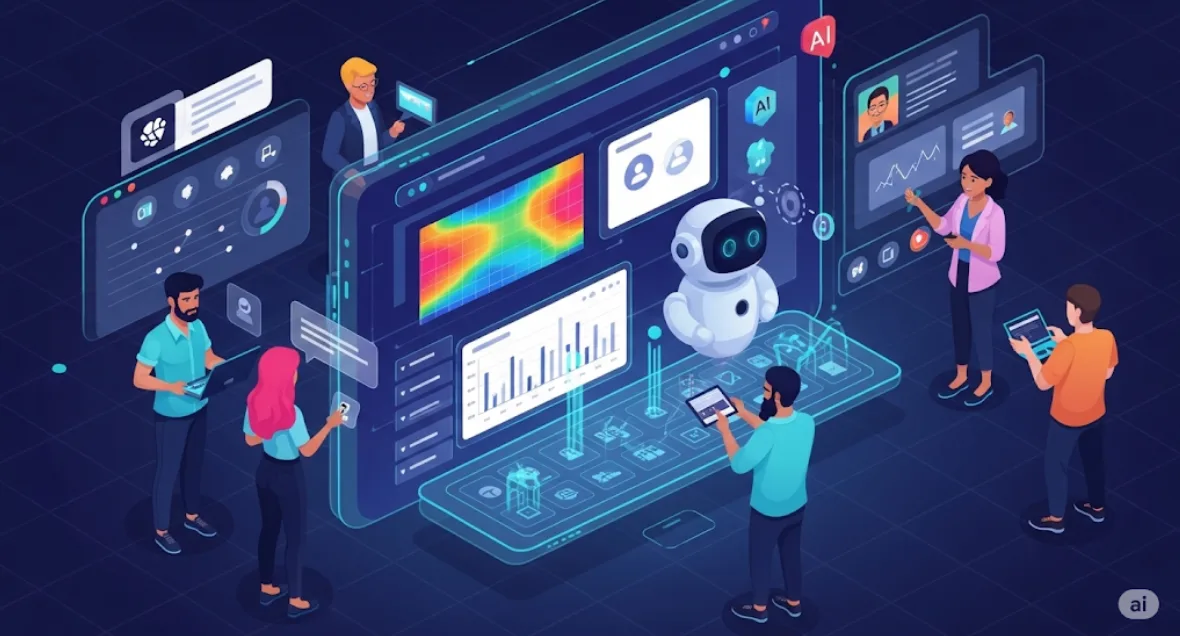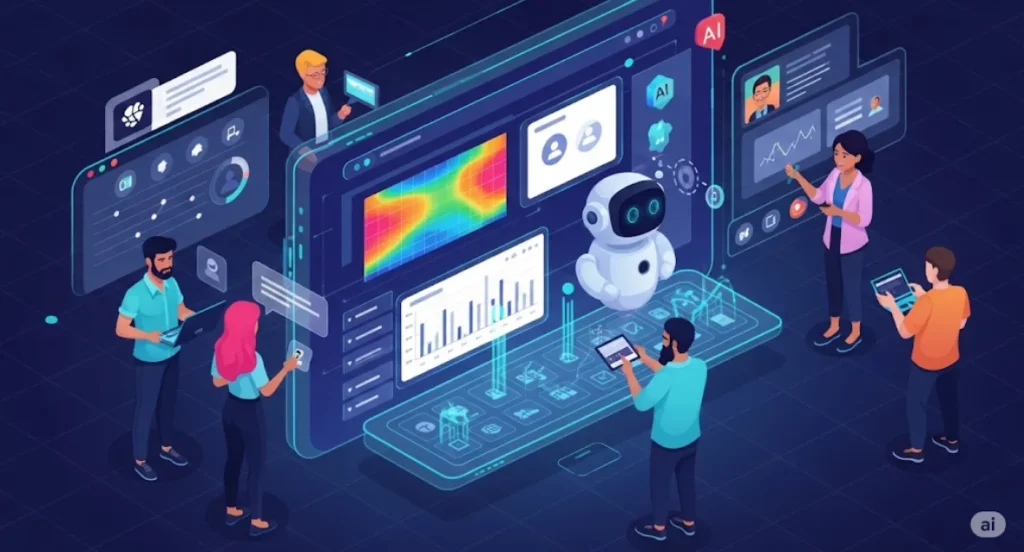In today’s hyper-competitive digital world, great user experience (UX) isn’t optional—it’s essential for achieving business success. Companies that prioritize UX see higher engagement, better retention, and increased revenue. But how can you take your user experience to the next level? The answer lies in understanding how to use AI for user experience and business goals.
AI (Artificial Intelligence) is reshaping how businesses optimize UX, making experiences more personalized, intuitive, and aligned with key objectives like sales, growth, and customer satisfaction.
This guide explains how to use AI for user experience and business goals with real-world examples, step-by-step strategies, and AI tools you can apply today.

🤖 Why Use AI for User Experience and Business Goals?
AI helps businesses:
✅ Personalize digital experiences
✅ Predict user behavior
✅ Automate customer interactions
✅ Improve product design through data
✅ Align UX improvements with business growth
Whether your goal is to boost conversions, retain customers, or increase engagement, knowing how to use AI for user experience and business goals gives you a major advantage.
🧩 What is AI-Driven User Experience (UX)?
AI-driven UX uses machine learning, data analysis, and automation to create better digital experiences. Instead of relying solely on manual research, AI helps:
✅ Analyze user behavior in real time
✅ Recommend personalized content or products
✅ Optimize interfaces based on data
✅ Automate repetitive UX improvements
✅ Predict and solve user pain points
Understanding how to use AI for user experience and business goals connects better design with measurable success.
📊 How AI Supports Business Goals Through UX
| Business Goal | How AI-Enhanced UX Helps |
|---|---|
| 🎯 Higher Conversions | AI personalizes product recommendations |
| 🔄 Improved Retention | AI predicts user churn and suggests fixes |
| 💡 Product Innovation | AI analyzes usage patterns for insights |
| 💰 Revenue Growth | Smarter UX boosts upsells and loyalty |
| 🛠️ Operational Efficiency | AI automates UX testing and optimization |
When you use AI for user experience and business goals, you create smarter, scalable customer journeys.
🛠️ Practical Ways to Use AI for User Experience and Business Goals
Let’s explore how to use AI for user experience and business goals with specific, actionable methods:
1. ✨ Personalization with AI
AI tailors experiences to individual users by:
✅ Recommending relevant products
✅ Customizing website content
✅ Delivering personalized emails or offers
Popular Tools:
Dynamic Yield: AI-driven content personalization
Segment: User data platform for AI recommendations
ChatGPT: AI-generated personalized support
Business Goal Impact:
✅ Higher engagement
✅ Increased sales
✅ Better user satisfaction
2. 🔍 AI-Powered User Behavior Analysis
Understanding how users interact with your product or website is crucial.
AI helps by:
✅ Tracking clicks, time spent, drop-off points
✅ Heatmap generation to visualize engagement
✅ Predicting friction points or user frustration
Popular Tools:
Hotjar AI: Heatmaps and behavior insights
Pendo: AI product usage analytics
FullStory: AI-based session recordings and behavior detection
Business Goal Impact:
✅ Better UX decisions based on real data
✅ Reduced user abandonment
✅ Improved product usability
3. 🤖 Chatbots and AI Virtual Assistants
AI chatbots enhance UX by:
✅ Providing 24/7 support
✅ Answering FAQs instantly
✅ Guiding users through websites or apps
Popular Tools:
Intercom AI: Conversational chatbots
Drift AI: Lead qualification and user guidance
Tidio AI: Affordable chatbot for small businesses
Business Goal Impact:
✅ Increased conversions
✅ Lower support costs
✅ Higher customer satisfaction
4. 🎯 Predictive Analytics for UX Optimization
AI predicts user actions, helping businesses:
✅ Detect churn risk
✅ Identify upsell opportunities
✅ Anticipate support needs
Popular Tools:
Mixpanel AI: Predictive user engagement analysis
Amplitude AI: Churn prediction and retention tools
Pecan AI: Forecasting user behavior for growth
Business Goal Impact:
✅ Proactive UX improvements
✅ Higher retention rates
✅ Smarter product development
5. 🛠️ AI for UX Design and Testing
AI accelerates UX design by:
✅ Generating interface prototypes
✅ Running automated A/B tests
✅ Providing design recommendations
Popular Tools:
Uizard AI: Quick UI prototypes with AI assistance
Adobe Sensei: AI-driven creative suggestions
Optimizely AI: Automated UX testing for better results
Business Goal Impact:
✅ Faster product iteration
✅ Higher-quality UX
✅ Improved user satisfaction
📘 How to Use AI for User Experience and Business Goals: Step-by-Step
Here’s a clear roadmap to integrate AI into your UX and align with business objectives:
✅ Step 1: Define Business Goals
Start with:
Increase conversions?
Reduce user churn?
Boost engagement?
Enhance support?
Knowing your objectives shapes your AI-UX strategy.
✅ Step 2: Map the User Journey
Identify key touchpoints:
✅ Homepage
✅ Product pages
✅ Checkout flow
✅ Support interactions
AI can improve specific stages based on real-time data.
✅ Step 3: Choose the Right AI Tools
Pick tools that match your goals:
Want better recommendations? Try Dynamic Yield
Need user insights? Use Hotjar AI
Improving support? Deploy a chatbot
✅ Step 4: Implement and Test
Run AI pilots:
✅ A/B test personalized pages
✅ Analyze AI chatbot performance
✅ Track user behavior changes
Iterate based on results to optimize both UX and business outcomes.
✅ Step 5: Scale and Automate
Once AI shows positive ROI:
✅ Expand AI recommendations across channels
✅ Automate behavior monitoring
✅ Continuously test UX improvements with AI
💡 Real-World Examples of AI for UX and Business Success
1. Amazon
AI suggests products based on browsing
Personalized emails and offers
Voice assistant (Alexa) enhances UX
Business Impact: Increased average order value, retention, and loyalty.
2. Netflix
AI recommends movies/shows based on preferences
Predictive engagement algorithms
Business Impact: Higher user engagement, reduced churn, global growth.
3. Shopify Stores
AI chatbots answer product questions
AI apps recommend upsells
Business Impact: Boosted conversion rates for small businesses.
⚖️ AI Ethics in UX and Business Goals
When using AI for user experience and business goals, ensure:
| Concern | Best Practice |
|---|---|
| Data Privacy | Use GDPR-compliant tools |
| Bias Reduction | Regular AI output reviews |
| Transparency | Let users know AI is involved |
| Human Oversight | Keep humans in critical decisions |
Responsible AI builds trust and enhances long-term success.
📊 Key Metrics to Track When Using AI for UX
| Metric | Business Insight |
|---|---|
| Conversion Rate | AI’s impact on sales or sign-ups |
| Engagement Time | How AI improves user time on site |
| Churn Rate | Predictive AI success in retention |
| NPS/CSAT Scores | User satisfaction post-AI upgrades |
| A/B Test Results | Data-backed UX decisions with AI |
🔮 The Future of AI for User Experience and Business Goals
Expect:
✅ Hyper-personalized digital experiences
✅ AI voice interfaces improving accessibility
✅ AI tools predicting user needs in real time
✅ Smarter UX design with AI collaboration
✅ AI aligning UX changes directly to revenue growth
Businesses that master how to use AI for user experience and business goals will thrive in 2025 and beyond.
🔗 Related Reads You Might Like:



Pingback: How to Use AI for Business Analytics: Smarter Decisions, Faster Growth - Trade Pluse Ai